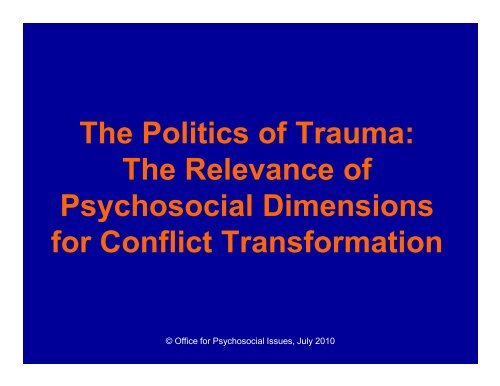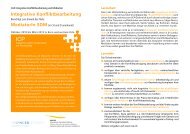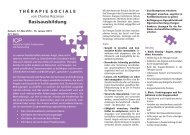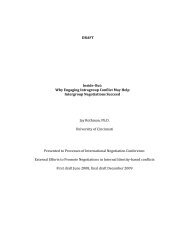Presentation David Becker on Trauma.pdf - ICP
Presentation David Becker on Trauma.pdf - ICP
Presentation David Becker on Trauma.pdf - ICP
You also want an ePaper? Increase the reach of your titles
YUMPU automatically turns print PDFs into web optimized ePapers that Google loves.
The Politics of <strong>Trauma</strong>:<br />
The Relevance of<br />
Psychosocial Dimensi<strong>on</strong>s<br />
for C<strong>on</strong>flict Transformati<strong>on</strong><br />
© Office for Psychosocial Issues, July 2010
Some c<strong>on</strong>flict definiti<strong>on</strong>s<br />
Norbert Ropers: C<strong>on</strong>flicts are an unavoidable side<br />
effect of living together in all societies, and are<br />
necessary for social change. They are an expressi<strong>on</strong><br />
of tensi<strong>on</strong>s and incompatibilities between different,<br />
mutually dependent parties with regard to their<br />
respective needs, interests and values. Such<br />
c<strong>on</strong>flicts lead to general social crises and<br />
destructive escalati<strong>on</strong> mainly in phases of profound<br />
socio-ec<strong>on</strong>omic change and political transformati<strong>on</strong>;<br />
that is when the redistributi<strong>on</strong> between different<br />
groups of opportunities and possibilities of<br />
participati<strong>on</strong> is at stake<br />
Karl Marx: The history of all hitherto existing society<br />
is the history of class struggles<br />
© Office for Psychosocial Issues, July 2010
Some more c<strong>on</strong>flict definiti<strong>on</strong>s<br />
Paul Lederach: C<strong>on</strong>flict transformati<strong>on</strong> is to envisi<strong>on</strong> and<br />
resp<strong>on</strong>d to the ebb and flow of social c<strong>on</strong>flict as life-giving<br />
opportunities for creating c<strong>on</strong>structive change processes that<br />
reduce violence, increase justice in direct interacti<strong>on</strong> and social<br />
structures, and resp<strong>on</strong>d to real-life problems in human<br />
relati<strong>on</strong>ships<br />
Laplanche & P<strong>on</strong>talis: In psychoanalysis, <strong>on</strong>e talks of c<strong>on</strong>flict if<br />
the subject is c<strong>on</strong>fr<strong>on</strong>ting c<strong>on</strong>tradictory inner demands.<br />
C<strong>on</strong>flict can be manifest (for example, between a desire and a<br />
moral demand, or between two c<strong>on</strong>tradictory feelings), or<br />
latent, and appear in a distorted form in the manifest c<strong>on</strong>flict, or<br />
express itself in the appearance of symptoms, behavioural<br />
problems, pers<strong>on</strong>ality disorders, etc. Psychoanalysis c<strong>on</strong>siders<br />
c<strong>on</strong>flict as being fundamental in human beings, in different<br />
forms: c<strong>on</strong>flict between desire and rejecti<strong>on</strong>, c<strong>on</strong>flict between<br />
the different systems or instituti<strong>on</strong>s, c<strong>on</strong>flicts between physical<br />
urges, finally the oedipal c<strong>on</strong>flict where c<strong>on</strong>tradictory desires<br />
are not <strong>on</strong>ly c<strong>on</strong>fr<strong>on</strong>ting each other, but where they resist the<br />
prohibiti<strong>on</strong>.<br />
© Office for Psychosocial Issues, July 2010
What do these visi<strong>on</strong>s of c<strong>on</strong>flict<br />
imply?<br />
C<strong>on</strong>flict is seen as something normal,<br />
positive and necessary<br />
The problem is thus not the c<strong>on</strong>flict but<br />
the way it is carried out<br />
C<strong>on</strong>flicts are rarely solved but can be<br />
transformed<br />
The aim of working <strong>on</strong> c<strong>on</strong>flict is to<br />
(re)establish c<strong>on</strong>flict capacity<br />
© Office for Psychosocial Issues, July 2010
Some issues to c<strong>on</strong>sider when<br />
analyzing/ mapping c<strong>on</strong>flict<br />
Multiple levels: Internati<strong>on</strong>al, Nati<strong>on</strong>al, Community, Individual/<br />
Domestic<br />
C<strong>on</strong>flict is not <strong>on</strong>ly when war happens<br />
C<strong>on</strong>flict has at least two participating parties, but usually more.<br />
Differentiating between actors and stake holders might make<br />
sense.<br />
4 Key C<strong>on</strong>flict Dimensi<strong>on</strong>s:<br />
- Political Ec<strong>on</strong>omy<br />
- Cultural Affiliati<strong>on</strong><br />
- Political Participati<strong>on</strong><br />
- Subject/ Subjective<br />
Projects might try to work around c<strong>on</strong>flict. They always work in<br />
the c<strong>on</strong>flict. At their best they c<strong>on</strong>sciously work <strong>on</strong> the c<strong>on</strong>flict.<br />
C<strong>on</strong>nectors and dividers cannot be simply assimilated to<br />
“good” and “bad”<br />
© Office for Psychosocial Issues, July 2010
What is “psychosocial”?<br />
“Psycho” refers to the inner world, to the world of<br />
emoti<strong>on</strong>s<br />
“Social” refers to society, to the world of social<br />
relati<strong>on</strong>ships<br />
“Psychosocial” as a c<strong>on</strong>ceptual approach thus<br />
focuses <strong>on</strong> individuals in relati<strong>on</strong>ship to their social<br />
c<strong>on</strong>text. It tries to combine individual and societal<br />
dimensi<strong>on</strong>s of analysis.<br />
Key Issues:<br />
- Threat -------------- Fear<br />
- Destructi<strong>on</strong> -------------- <strong>Trauma</strong><br />
- Loss -------------- Grief<br />
Key Words: Empowerment / Disempowerment<br />
© Office for Psychosocial Issues, July 2010
Threat and Fear<br />
Fear as a normal self protecti<strong>on</strong><br />
mechanism<br />
Chr<strong>on</strong>ic fear as a key feature o c<strong>on</strong>flict<br />
and post c<strong>on</strong>flict situati<strong>on</strong>s<br />
© Office for Psychosocial Issues, July 2010
The double genealogy and identity<br />
of trauma theory<br />
Scientific development <strong>on</strong> <strong>on</strong>e side and<br />
developing societal c<strong>on</strong>flicts <strong>on</strong> the other<br />
side<br />
Clinical term <strong>on</strong> <strong>on</strong>e side and moral<br />
category in a given sociopolitical situati<strong>on</strong><br />
<strong>on</strong> the other side<br />
© <str<strong>on</strong>g>David</str<strong>on</strong>g> © <str<strong>on</strong>g>Becker</str<strong>on</strong>g>, Office for Office Psychosocial for Psychosocial Issues, Issues, July 2010 Juni 2010
Psychoanalytic Developments<br />
The original metaphor of the tear between<br />
self and reality, the quantitative moment<br />
Seducti<strong>on</strong> theory, deferred acti<strong>on</strong><br />
(Nachträglichkeit), infantile sexuality<br />
Ferenczi‘s Dilemma<br />
Balint, Winnicott, Khan and the<br />
development of a relati<strong>on</strong>al trauma theory<br />
© <str<strong>on</strong>g>David</str<strong>on</strong>g> © <str<strong>on</strong>g>Becker</str<strong>on</strong>g>, Office for Office Psychosocial for Psychosocial Issues, Issues, July 2010 Juni 2010
Development Processes in Society<br />
Train accidents, working accidents, shell<br />
shocked soldiers: Victims committing insurance<br />
frauds, simulating pain, being cowards<br />
The Holocaust as paradigm of trauma theory:<br />
The recogniti<strong>on</strong> of the victims, testim<strong>on</strong>y,<br />
punishing perpetrators, compensati<strong>on</strong>s<br />
(Wiedergutmachungsleistungen)<br />
The Vietnam War and taking morals out of the<br />
trauma c<strong>on</strong>cept: Victims and Victimizers are<br />
traumatized<br />
© <str<strong>on</strong>g>David</str<strong>on</strong>g> © <str<strong>on</strong>g>Becker</str<strong>on</strong>g>, Office for Office Psychosocial for Psychosocial Issues, Issues, July 2010 Juni 2010
Frantz Fan<strong>on</strong>: The imperial violence and<br />
ist psychological power<br />
Black skin and white masks: The<br />
unavoidability of alienated, imperial<br />
identity c<strong>on</strong>structi<strong>on</strong>s<br />
Extreme violence as the key gift of the<br />
col<strong>on</strong>ial powers to the col<strong>on</strong>ized people.<br />
Civilizati<strong>on</strong> in its essence is barbarianism.<br />
© <str<strong>on</strong>g>David</str<strong>on</strong>g> © <str<strong>on</strong>g>Becker</str<strong>on</strong>g>, Office for Office Psychosocial for Psychosocial Issues, Issues, July 2010 Juni 2010
Edward Said : Overlapping territories and<br />
entangled histories<br />
Empire as a reality in and through culture<br />
Understanding of histroical processes not<br />
<strong>on</strong>ly in termsof time but i terms of space:<br />
The relecnce of geography<br />
The unavoidability of entangled histories<br />
The possibility of c<strong>on</strong>tra punctual reading<br />
of texts<br />
© <str<strong>on</strong>g>David</str<strong>on</strong>g> © <str<strong>on</strong>g>Becker</str<strong>on</strong>g>, Office for Office Psychosocial for Psychosocial Issues, Issues, July 2010 Juni 2010
Three key problems every trauma theory<br />
needs to deal with<br />
The relati<strong>on</strong>ship between inside and<br />
outside<br />
Time<br />
C<strong>on</strong>text<br />
© <str<strong>on</strong>g>David</str<strong>on</strong>g> © <str<strong>on</strong>g>Becker</str<strong>on</strong>g>, Office for Office Psychosocial for Psychosocial Issues, Issues, July 2010 Juni 2010
The main stupidities of PTSD<br />
diagnosis<br />
"Post", although there is no post in sociopolitical<br />
traumatizati<strong>on</strong>s<br />
"Stress", although trauma is always more than<br />
stress, that is destructi<strong>on</strong><br />
"Disorder", although „psychopathologizing“ political<br />
reality makes the illness worse<br />
Incomplete list of symptoms<br />
Individual diagnosis, no possibility to diagnose<br />
families or understand so called sec<strong>on</strong>dary<br />
traumatizati<strong>on</strong>s or transgenerati<strong>on</strong>al processes<br />
Cultural ignorance<br />
Time<br />
Political ignorance<br />
© <str<strong>on</strong>g>David</str<strong>on</strong>g> © <str<strong>on</strong>g>Becker</str<strong>on</strong>g>, Office for Office Psychosocial for Psychosocial Issues, Issues, July 2010 Juni 2010
PTSD: A post col<strong>on</strong>ial inventi<strong>on</strong><br />
Suffering is acknowledged, but depleted of its<br />
c<strong>on</strong>tents<br />
Social processes are recognized as producing<br />
illness, but themselves are being ignored/ silenced<br />
While <strong>on</strong> <strong>on</strong>e side possibilities develop to recognize<br />
traumatic suffering and deal with it, at the same time<br />
culturally specific characteristics are ignored and<br />
post col<strong>on</strong>ial power structures are denied<br />
History suddenly becomes important but is reduced<br />
to a linear stimulus-resp<strong>on</strong>se reacti<strong>on</strong><br />
Victims and perpetrators are jointly acknowledged<br />
as victims<br />
© <str<strong>on</strong>g>David</str<strong>on</strong>g> © <str<strong>on</strong>g>Becker</str<strong>on</strong>g>, Office for Office Psychosocial for Psychosocial Issues, Issues, July 2010 Juni 2010
© Office for Psychosocial Issues, July 2010
Relevant Ideas <strong>on</strong> <strong>Trauma</strong> in the<br />
C<strong>on</strong>text of Man Made Disasters<br />
<strong>Trauma</strong> is a normal reacti<strong>on</strong> to an abnormal situati<strong>on</strong>.<br />
<strong>Trauma</strong> is when memory (individual and social) falls apart.<br />
<strong>Trauma</strong> can <strong>on</strong>ly be understood within and in reference to a<br />
specific social/cultural/political c<strong>on</strong>text.<br />
<strong>Trauma</strong> is cumulative and sequential. In short it is a process of<br />
which we can sometimes determine when it starts, but nearly<br />
never when it stops.<br />
<strong>Trauma</strong> implies complete psychological breakdown <strong>on</strong> an<br />
individual level, comparable to the experience of death.<br />
Nevertheless there is always a social, i.e. collective dimensi<strong>on</strong><br />
to trauma, in so far as the social relati<strong>on</strong>ships themselves are<br />
characterized, by a violent power struggle that includes fear,<br />
death and destructi<strong>on</strong>.<br />
We have to differentiate between traumatic situati<strong>on</strong>s, trauma<br />
and trauma symptoms.<br />
© Office for Psychosocial Issues, July 2010
Loss and Grief<br />
The two phases of a grief process<br />
The relevance of grieving<br />
Memory, grieving and the future<br />
Disturbed grief processes<br />
© Office for Psychosocial Issues, July 2010
The difficulty of combining<br />
individual and collective<br />
dimensi<strong>on</strong>s<br />
Although individual and collective<br />
dimensi<strong>on</strong>s relate to, overlap and imply<br />
each other, they somehow never really<br />
match up<br />
The danger of analogies<br />
Chosen trauma as a case in point<br />
© Office for Psychosocial Issues, July 2010
Dealing with psychosocial<br />
dimensi<strong>on</strong> in <strong>on</strong>going c<strong>on</strong>flict<br />
Dealing with threat and fear<br />
Understanding dissociati<strong>on</strong><br />
Understanding passivity, hopelessness, “traumatic<br />
stupidity”<br />
Understanding humiliati<strong>on</strong> and shame<br />
Using the difference between acute terror and<br />
chr<strong>on</strong>ificati<strong>on</strong><br />
Facilitating empowerment<br />
Dealing with sec<strong>on</strong>dary traumatizati<strong>on</strong><br />
Security issues<br />
Self protecti<strong>on</strong><br />
© Office for Psychosocial Issues, July 2010
Dealing with psychosocial<br />
dimensi<strong>on</strong>s in post c<strong>on</strong>flict<br />
situati<strong>on</strong>s<br />
Understanding <strong>on</strong>going fear<br />
Understanding <strong>on</strong>going trauma<br />
Understanding submissi<strong>on</strong> and<br />
authoritarianism<br />
Understanding the limits of reparati<strong>on</strong><br />
The vicissitudes of rec<strong>on</strong>ciliati<strong>on</strong><br />
How important are the victims?<br />
Justice?<br />
Peace and Harm<strong>on</strong>y: Two doubtful<br />
perspectives<br />
© Office for Psychosocial Issues, July 2010
The culture of lies<br />
The hidden agenda of the d<strong>on</strong>ors.<br />
The hidden activities of the receivers.<br />
Politicians and political abuse.<br />
The c<strong>on</strong>tradictory wishes of the clients.<br />
Bombs, <strong>Trauma</strong> Centers, Income Generati<strong>on</strong>,<br />
Exit Strategies: From war to health to wealth<br />
to nothing.<br />
“Peace Builders”, “Mediators” and other<br />
strange animals<br />
The doubtful “Swiss” identity of evaluators.<br />
© Office for Psychosocial Issues, July 2010











